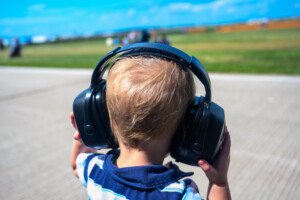
Are you afraid of what strangers will think if you put ear muffs on your young child at a loud sporting event to protect their hearing?
If so shame on you over and over.
For very young children, hearing protection needs to be in the form of the so-called ear muffs, since ear plugs can be removed and swallowed.
Older kids, of course, won’t be swallowing ear plugs. But all children should have protection in or over their ears from the loud screaming, hollering and other booming noise sources of sporting events.
If adults need hearing protection, why wouldn’t kids, preschoolers and babies? Don’t worry what strangers will think!
You should NEVER care what strangers think of any health-conscious actions you take for yourself or your children and babies.
If someone asks about “what’s on his ears” or “what are those for?” then graciously educate these ignorant people who can’t figure out the obvious. They may actually thank you.
It’s really mind bending why it’s virtually unheard of (no pun intended) for parents to require their kids to wear ear plugs or protection at sporting events.
• Many parents will make their kids wear sunscreen at sporting events.
• They’ll make them wear helmets while bicycle riding.
• They’ll make them wear knee and elbow pads for inline skating.
I realize that padding protects against instant, traumatic injury that can be seen right then and there.
But sunscreen protects against cumulative damage from an external agent, the sun. And I’m all for that, too.
So why don’t these same parents mandate ear plugs (or muffs) to protect against cumulative exposure of loud noise?
Let me guess: Hearing protection is visible, easily seen by strangers, while sunscreen is invisible!
For Pete’s sake, stop ranking the opinions of ignorant strangers above the heath of your child’s ears!
“Loud sounds of sporting events are part of the experience for many individuals,” says Rivka Strom, AuD, CCC-A, Director of Audiology, Advanced Hearing NY Inc.
“People want to feel the sounds around them including the loud roaring/cheering of fellow fans,” continues Strom.
“But many do not realize how dangerously loud these events truly are.
“One of the loudest sporting event was on September 29, 2014, where the loudest crowd roar was recorded at a Kansas City Chiefs game, at Arrowhead Stadium in Kansas City, Missouri.
“The roar clocked in at 142.2 dBA and was recorded with eight seconds remaining in the first quarter (Prusick, 2015).”
The loudest roar at an indoor sporting event was 126 decibels (Sacramento Kings vs. Detroit Pistons, Nov. 15, 2013).
Strom explains, “All individuals attending these events should be wearing hearing protection devices, but this is especially so for children who are at a greater risk when exposed to high noise levels.”
Most sporting events are not 126, let alone, 142 decibels.
However, Lindsay Prusick, an audiologist with Starkey Hearing Technologies, says on its website that “exposure to a sound that is 120 dB or louder causes immediate damage.”
You will not always detect that damage immediately. Think of the insidiousness of hearing loss as akin to the slowly creeping-up-on-you damage from sun exposure without sunscreen.
Years later it can result in ugly crinkles or cancer, but after just one afternoon in the sun without protection, you may only notice a little tan, a burn that disappears in a week, or no visible change at all.
And you certainly won’t be able to see DNA damage or a swath of leathery skin just from a single afternoon!
Sporting events, says Prusick on the site, though usually not 126 decibels, “are still very loud and can be hazardous to your hearing.”
How loud are sporting events?
• Basketball: 99-118
• Auto racing: 90-115
• Baseball: 85-107
• Football: 81-91
The Starkey site says that if you attend a basketball game of 97 decibels, “you can only be exposed to this level for 30 minutes before you run the risk of damaging your hearing” without ear plugs or muffs.
I can honestly tell you that I’ve never been in a fist fight over my hearing protection. Occasionally someone asks about it and I educate them.
So what are YOU afraid of?
If your older children balk at wearing hearing protection or ear plugs, ask yourself who’s the boss? You make them eat vegetables, right?
Then make ‘em wear hearing protection.
Children who learn EARLY in life about the value of hearing protection will less likely balk when they’re older and have to wear the ear plugs at sporting events (after you make them eat their broccoli and clean their room, of course!).

Dr. Strom is a member of the American Speech Language and Hearing Association and has received several awards including Brooklyn College’s Excellence In Audiology Award.
 Lorra Garrick has been covering medical, fitness and cybersecurity topics for many years, having written thousands of articles for print magazines and websites, including as a ghostwriter. She’s also a former ACE-certified personal trainer.
Lorra Garrick has been covering medical, fitness and cybersecurity topics for many years, having written thousands of articles for print magazines and websites, including as a ghostwriter. She’s also a former ACE-certified personal trainer.
.
























